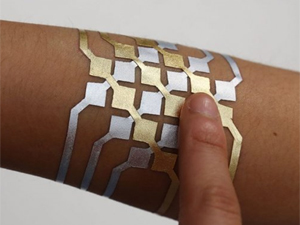



Date:07/02/19
 Researchers at the University of Connecticut and University of Toronto have developed artificial skin that could give its wearer — robotic or human — superhuman capabilities. The stretchable skin is equipped with multifunctional sensors that could sense a strong magnetic field or changes in pressure.
Researchers at the University of Connecticut and University of Toronto have developed artificial skin that could give its wearer — robotic or human — superhuman capabilities. The stretchable skin is equipped with multifunctional sensors that could sense a strong magnetic field or changes in pressure.
Their research was published in the journal Advanced Materials earlier this week.
“It is a new group of smart wearable electronics that are flexible, stretchable, shapable, and possess unique sensing capabilities that mimic human skin,” postdoctoral fellow at UConn Islam Mosa told Digital Trends.
But it could also go beyond merely mimicking human skin. “It would be very cool if it had abilities human skin does not; for example, the ability to detect magnetic fields, sound waves, and abnormal behaviors,” Mosa told Science Daily.
The artificial skin could have a number of uses: for instance it could assist during the disposal of hazardous materials, robotic search and rescue missions or even help with remote health care monitoring. It could even give back amputees and burn victims a degree of feeling.
The wearable uses a “multimodal ferrofluid‐based triboelectric nanogenerator” (FO-TENG) that’s essentially an elastic silicone nanotube filled with ferrofluid — a type of iron oxide nanoparticle fluid that can react to magnetic fields. The tube is wrapped with copper wire to allow electrical signals to be sent through it.
The skin has “excellent waterproof ability, conformability, and stretchability” according to the paper, and could hold its shape for years.
But it’s not exactly flat like skin yet. The team of researchers still have to find a way to bring down the profile of their tubular prototype so it can act more like a skin.
Pending approval by the U.S. Food and Drug Administration, the researchers are hoping to bring their futuristic skin to market in a matter of years.
Artificial ‘Electronic Skin’ Could Warn Humans of Impending Danger
 Researchers at the University of Connecticut and University of Toronto have developed artificial skin that could give its wearer — robotic or human — superhuman capabilities. The stretchable skin is equipped with multifunctional sensors that could sense a strong magnetic field or changes in pressure.
Researchers at the University of Connecticut and University of Toronto have developed artificial skin that could give its wearer — robotic or human — superhuman capabilities. The stretchable skin is equipped with multifunctional sensors that could sense a strong magnetic field or changes in pressure.Their research was published in the journal Advanced Materials earlier this week.
“It is a new group of smart wearable electronics that are flexible, stretchable, shapable, and possess unique sensing capabilities that mimic human skin,” postdoctoral fellow at UConn Islam Mosa told Digital Trends.
But it could also go beyond merely mimicking human skin. “It would be very cool if it had abilities human skin does not; for example, the ability to detect magnetic fields, sound waves, and abnormal behaviors,” Mosa told Science Daily.
The artificial skin could have a number of uses: for instance it could assist during the disposal of hazardous materials, robotic search and rescue missions or even help with remote health care monitoring. It could even give back amputees and burn victims a degree of feeling.
The wearable uses a “multimodal ferrofluid‐based triboelectric nanogenerator” (FO-TENG) that’s essentially an elastic silicone nanotube filled with ferrofluid — a type of iron oxide nanoparticle fluid that can react to magnetic fields. The tube is wrapped with copper wire to allow electrical signals to be sent through it.
The skin has “excellent waterproof ability, conformability, and stretchability” according to the paper, and could hold its shape for years.
But it’s not exactly flat like skin yet. The team of researchers still have to find a way to bring down the profile of their tubular prototype so it can act more like a skin.
Pending approval by the U.S. Food and Drug Administration, the researchers are hoping to bring their futuristic skin to market in a matter of years.
Views: 427
©ictnews.az. All rights reserved.Similar news
- Azerbaijani project to monitor disease via mobile phones
- Innovative educational system to be improved under presidential decree
- NTRC prolongs license of two TV and radio organizations for 6 years
- Azerbaijan establishes e-registry for medicines
- Azerbaijani museum introduces e-guide
- Nar Mobile opens “Nar Dunyasi” sales and service center in Siyazan city
- International conference on custom electronic services held in Baku
- OIC secretary general to attend COMSTECH meeting in Baku
- Azerbaijan develops earthquake warning system
- New law to regulate transition to digital broadcasting in Azerbaijan
- Azerbaijani State Social Protection Fund introduces electronic digital signature
- Intellectual traffic management system in Baku to be commissioned in December
- Tax Ministry of Azerbaijan started receiving video-addresses
- World Bank recommends Azerbaijan to speed up e-service introduction in real estate
- Azerbaijan to shift to electronic registration of real estate





















